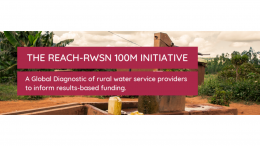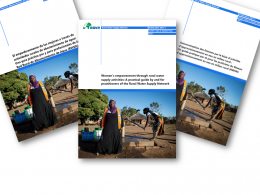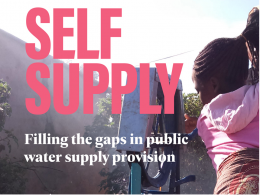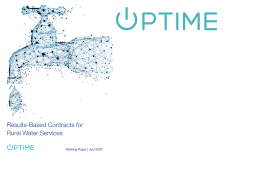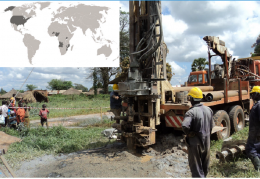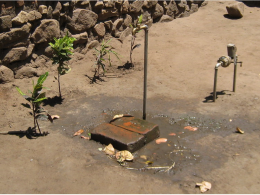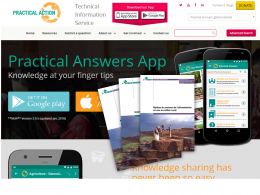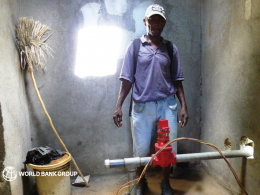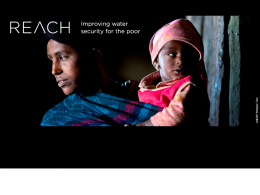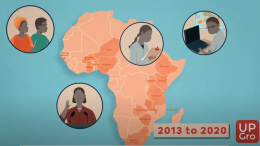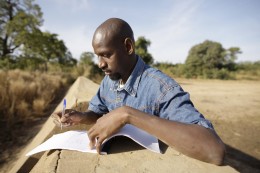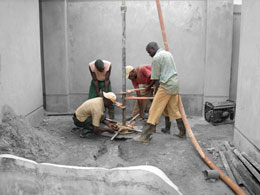Highlights of RWSN's projects, partnerships and knowledge products
Collaborations
The REACH/RWSN 100 Million Initiative
A Global Diagnostic of rural water service providers to inform results-based funding
Project start: 2020 • Project finished: 2030
Collaborators: REACH; Uptime Consortium; University of Oxford; other partners
Funder: Foreign, Commonwealth and Development Office (FCDO)
Summary
Following the 100 Million Initiative global diagnostic study of rural water service providers, the RWSN-REACH 100 Million Initiative is proceeding to a second round of data collection, and inviting rural water service providers to submit a sample of service data from part of their operations for the period of one quarter of a year. This sample data will be used to identify rural water service providers who are able to provide sufficient data quality to participate in results-based funding arrangements that funders could establish. This process will also be used to help potential donors understand the size and scale of service providers who may be ready for results-based funding.
Women’s empowerment through rural water supply / Autonomisation des femmes par le biais d’activités d'approvisionnement en eau en milieu rural
A practical guide / Un guide pratique / Una guía práctica
Project start: 2020 • Project finished:
Collaborators: RWSN Members from the Leave No-one Behind Community
Funder: SDC
Summary
This practical guide is the result of a consultation and co-creation process with members of the Rural Water Supply Network (RWSN). Engineers and gender experts have come together to overcome jargon barriers from their respective disciplines. This guide aims to pro-vide water specialists with the language and knowledge on how best to work with gender experts to build more transformative activities.Ce guide pratique est le fruit d'un processus de concertation et de cocréation avec les membres du réseau d’approvisionnement en eau en milieu rural (Rural Water Supply Network, RWSN). Des ingénieurs et des spécialistes des questions de genre se sont réunis pour faire tomber les barrières du jargon de leurs disciplines respectives. Ce guide a pour but d'apporter aux spécialistes de l'eau le langage et les connaissances sur la meilleure façon de travailler avec des spécialistes des questions de genre pour élaborer des activités plus transformatrices.
Esta guía práctica es el resultado de un proceso de consulta y de co-creación con miembros de la Red Rural de Abastecimiento de Agua (RWSN). Ingenieros y expertos en género se han unido para superar las barreras que supone la jerga de sus respectivas disciplinas. Esta guía tiene como objetivo proporcionar a los especialistas en agua el lenguaje y el conocimiento sobre la mejor manera de trabajar con expertos en género para construir actividades más transformadoras.
New Book: Self-supply - Filling the gaps in public water supply provision
Project start: 2021 • Project finished:
Collaborators: Dr Sally Sutton (Ind), Dr John Butterworth (IRC), Practical Action Publishing
Funder: IRC, SWL Consultants
Uptime: Delivering Reliability for 100 Million People by 2030
Temps de fonctionnement : Garantir la fiabilité à 100 millions de personnes d'ici 2030
Project start: • Project finished:
Collaborators: FundiFix, Water for Good, Water Mission, UDUMA, Whave, Oxford University
Funder: GIZ, Osprey Foundation
Summary
Uptime is a global consortium working to deliver drinking water services to millions of rural people through long-term, performance-based funding to achieve Sustainable Development Goal 6.1.
Challenges of Water Well Drillers & Water Well Drillers Associations
Case Studies of Six Countries Angola, Burkina Faso, Mozambique, Nigeria, Uganda and United States of America
Project start: 2018 • Project finished: 2020
Collaborators: Skat Foundation
Funder: Skat Foundation
Summary
Groundwater has been identified as the key to sustainable development and forms the foundation for achieving the Sustainable Development Goals (SDGs) (UN-Water, 2018). Although not properly recognised in the SDG framework, its importance is seen in its provisioning and regulating functions (e.g. maintaining river base flow, preventing land subsidence and seawater intrusion), and acting as a solution for climate change adaptation. Groundwater accounts for over 97% of the world’s freshwater resources, and it is readily available.Groundwater is diminishing in some regions, and water quality deterioration is increasing (UN-Water, 2018). With no incentives to save groundwater, the impacts of unsustainable use are slow and multiple (Villholth, 2018). In order to sustainably manage groundwater resources, intervention is needed at different levels and in accordance with local contexts.
Drillers are in direct contact with groundwater resources and thus understand key issues on the ground. If well organised, such as in the form of an association, and empowered with knowledge, drillers can advocate for and influence policies at state and national levels, and even lobby the governments to bring groundwater issues to the forefront.
Safe Water: monitoring, data and decisions
Une eau potable gérée en toute sécurité: surveillance, données, décisions
Project start: 2019 • Project finished: -
Collaborators: University of North Carolina, RWSN
Funder:
Summary
New partnership between RWSN and The Water Institute of UNCNouveau partenariat entre RWSN et le Water Institute à UNC Chapel Hill
We are excited to announce a new partnership between RWSN and The Water Institute at UNC Chapel Hill. This partnership will leverage the RWSN platform and The Water Institute’s expertise in water quality and management to bring up-to-date evidence and methods to the members of the network. As a new Topic Leader in Mapping and Monitoring,
The Water Institute aims to bring evidence and practice closer by facilitating lively discussion and producing practical guidance on Safely Managed Water. The new partnership will begin in 2019, so look out for The Water Institute’s new weekly Mapping Monday posts in the RWSN Mapping and Monitoring online community in the New Year!
Nous sommes ravis d'annoncer un nouveau partenariat entre RWSN et le Water Institute à UNC Chapel Hill. Ce partenariat s’appuiera sur la plateforme RWSN et sur l’expertise du Water Institute en matière de qualité et de gestion de l’eau pour apporter des données et des méthodes scientifiques de pointe aux membres du réseau. En tant que nouveau responsable du Thème cartographie et de surveillance, The Water Institute a pour objectif de rapprocher la science et les pratique en facilitant une discussion animée et en produisant des conseils pratiques sur une eau gérée de manière sûre. Le nouveau partenariat débutera en 2019, alors ne manquez pas les nouveaux articles hebdomadaires intitulés Mapping Monday du Water Institute dans la communauté en ligne RWSN dédiée à la cartographie et au suivi !
RWSN Publications - now on Practical Answers
RWSN Publications - maintenant sur Practical Answers
Project start: 2018 • Project finished:
Collaborators: RWSN, Practical Action
Funder: SDC
Summary
To help rural water professionals get access to the inform they need, RWSN has teamed up with Practical Action to make some of our leading publications available on the Practical Answers website and mobile App.Let is know if there are any particular resources or publications that you would like to have on this platform.
Pour aider les professionnels de l’eau en milieu rural à accéder aux informations dont ils ont besoin, le RWSN s’est associé à Practical Action pour rendre certaines de nos principales publications disponibles sur le site Web de Practical Answers et l’application mobile.
Indiquez s'il existe des ressources ou des publications particulières que vous aimeriez avoir sur cette plate-forme.
Technology Applicability Framework (TAF) & Technology Introduction Process (TIP)
WASHtechnologies.net
Project start: 2011 • Project finished:
Collaborators: Skat Foundation, WaterAid, GIZ. The WASHTech consortium consisted of IRC WASH, WaterAid, Cranfield University, Skat Foundation, WSA, TREND, KNUST and NETWAS
Funder: Currently un-funded
Summary
The TAF is a tried-and-tested way of helping organisations improve their understanding of whether a technology that is designed to tackle a Water, Sanitation and Hygiene (WASH) problem will work in a particular context. This improved understanding can be used to support decisions on:1. Whether or not to invest or support the introduction of Technology X in Context Y
2. Whether or not to continue to invest, support or approve the introduction of Technology X in Context Y
3. Is Technology X ready to scale-up? And what are context-sensitive factors that may play a major role in the success or failure of widespread promotion and uptake?
Although the TAF was developed for WASH technologies, it can be used for any type of technology or product, and has been adapted by others for renewable energy technologies.
Sustainability Assessment of Rural Water Service Delivery Models
Findings of a Multi-Country Review
Project start: 2016 • Project finished: 2017
Collaborators: The World Bank, Aguaconsult, IRC
Funder: The World Bank
Summary
Failure by governments and development partners to ensure sustained access to basic water supplies in rural areas is, to a large extent, the result of inadequate investment to deliver infrastructure where needed. It is also the result of a failure to ensure that infrastructure, once in place, continues to effectively provide the expected services over time.Impressive gains from the Millennium Development Goal (MDG) era remain fragile and at risk, with various empirical studies indicating that 30 percent to 40 percent of rural water infrastructure is not functioning or functions below expected service levels (RWSN 2010).
REACH: Improving water security for the poor
A global research programme to improve water security for millions of poor people in Asia and Africa.
Project start: 2015 • Project finished: 2022
Collaborators: Oxford University, UNICEF, Water and Land Resource Centre, Bangladesh University of Engineering and Technology, icddr,b, University of Dhaka, University of Nairobi, IFPRI, IWA, RWSN, IRC.
Funder: DFID
Summary
REACH is a seven-year, global programme of research (2015-2022) led by Oxford University and funded by the UK Department for International Development (DFID) that aims to improve water security for over 5 million poor people by 2022.As a Research into Action partner, the Rural Water Supply Network will support the design and implementation of the programme’s communications strategy, supporting the uptake of the research findings and ensuring that they translate into positive policy and practice outcomes.
'Smart Handpumps'
Handpumps can be better - who is leading the way?
Project start: • Project finished:
Collaborators: Several
Funder: Several
Summary
Drilling a borehole and installing a handpump is a common way to improve access to water for rural (and urban) people in many parts of the world. However, the failure of these water points is shockingly high, a third in many African and Asian countries and often much higher.New communications technology is opening up the possibilities for 'Smart Handpumps' - handpumps that actively record how and when they are used and transmits that data to an organisation who can use that information to (a) mobilise targeted maintenance and repairs; (b) identity priority areas for future improvements and investments; (c) to understand the user needs better, and main other reasons that shift rural water supply away from 'fire-and-forget' projects and towards water services that last and that reach everyone.
UPGro – African Groundwater 2020
Final report from Unlocking the Potential for Groundwater for the Poor
Project start: 2013 • Project finished: 2020
Collaborators: Skat Foundation, Richard Carter & Associates + research teams from across Africa and Europe.
Funder: UK's Department for International Development (DFID), Natural Environment Research Council (NERC) and in principle the Economic and Social Research Council (ESRC)
Summary
Unlocking the Potential of Groundwater for the Poor (UPGro), was a seven-year international research programme (2013-2020) which was jointly funded by UK’s Department for International Development (DFID), Natural Environment Research Council (NERC) and the Economic and Social Research Council (ESRC).Nearly 200 of the world’s best researchers from more than 50 organisations across Africa and Europe were focused on improving the evidence base around groundwater availability and management in Sub-Saharan Africa. The goal has been to ensure that the hidden wealth of Africa’s aquifers benefit all citizens and the poorest in particular. UPGro projects have been interdisciplinary, linking the social and natural sciences to address this challenge
Myths of Rural Water Supply
Learning from past failures, building on successes
Project start: 2010 • Project finished:
Collaborators: UNICEF, Skat, WaterAid, Water & Sanitation Program, African Development Bank, Swiss Development Cooperation
Funder:
Summary
Ensuring that rural dwellers around the world do not have to walk for hours to collect sufficient and safe drinking water is a huge challenge. In 2010, RWSN published "Myths of the Rural Water Supply Sector" which raises issues for those of us who are involved in trying to improve rural water supplies, whether as donor, Government or NGO; program manager or practitioner. It takes a hard look at our limited achievements, points to areas where our approaches need to be radically improved and sets some challenges.
Writing Course for WASH Professionals
Skat, WaterAid, SHARE, Waterlines Journal
Project start: 2012 • Project finished: -
Collaborators: RWSN, Skat, WaterAid, SHARE, Waterlines Journal
Funder: SHARE
Summary
The ChallengeOver 2.5 billion have no access to improved sanitation and 780 million people lack access to improved sources of drinking water, according to the WHO/UNICEF Joint Monitoring Programme (2012). The numbers are staggering. The suffering is real. The challenge to overcome is immense. Success can only come through a combination of action and communication. Both are critical.
We have a vision where Water, Sanitation and Hy-giene (WASH) professionals are regularly sharing and learning – at all levels from districts to global networks. As a sector, we also need to reach out and communicate with wide range of audiences: politicians, policymakers, companies, water users, and the public in all countries.
We often have the content: experiences, data, pro-jects, methodologies and stories of success and failure. What we are often not great at is explaining ourselves to others in a way that leads to positive action.
We want to change that.
Professionalising Manual Drilling
UNICEF, Skat Foundation
Project start: 2013 • Project finished: 2014
Collaborators: UNICEF, Skat Foundation
Funder: UNICEF, Skat Foundation
 Google Übersetzer
Google Übersetzer

